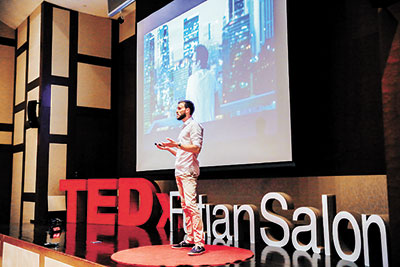
Zhang Qian, Zou Jingke zhqcindy@163.com HOW smart will cities be in the future? What role will mankind play within them? Standing at the forefront of time, three speakers were invited to share their vision of how smart cities will be and how people will integrate with them from the perspectives of technology and data in a TED salon in September. On the night of Sept. 22, the TEDxFutian Salon fall session themed “One Day in a Smart City” was held in Futian Shangri-La, Shenzhen. The organization is one of the most dynamic TED-authorized NGOs in Shenzhen that carries out TED-style talks, salons and annual conferences on a regular basis. The salon in September kicked off with a talk delivered by Loic Kobes, a French entrepreneur who owns a tech-driven e-commerce company in Shenzhen trading Europe-made products with the latest in virtual reality (VR) technology in China. Kobes’ speech was titled “The Shadow of Tech.” From his point of view, people in smart cities will be able to work and live where they feel most comfortable in the future, and the very concept of a city will likely grow obsolete thanks to ever-developing technologies helping people think and act beyond the limitations of space. The French entrepreneur believes that technology is expanding the possible interactions between the virtual and real worlds, making online shopping, working, learning and medical activities possible. As a result, the traditional definition of “territorial boundaries” will disappear. “Modern cities have so many problems because of the industrial development, such as pollution, noise and congested traffic, but I believe technology will change all of these problems as we can choose to live in the mountains but still get in touch with our colleagues or working partners with technology,” said Kobes. In addition to his thoughts on the changing definition of what cities are, Kobes thinks Shenzhen will be one of the first cities in the world to become a metropolis that achieves a high degree of intelligent artificial reality (AR) technologies. “There are two main reasons that Shenzhen is a remarkable city for AR development: People in the city are young, and this is the center of both software and hardware manufacturing,” said Kobes. The second speaker was Zheng Haitao, a computer scientist and an associate professor from Tsinghua University. Unlike Kobes, Zheng thinks that the city is not as “smart” as people assume. In his talk, the professor highlighted the importance of big data and the application of it for the development of a true smart city and its “smart residents.” “All we need is an ‘intelligent brain,’ the establishment and development of which requires two mechanisms: big data sharing and robot training,” said Zheng. If everyone could share his/her consciousness or behavior in the form of data and share it with others, mankind would be able to build the “brain” in the most dynamic way possible. When that day comes, everyone can then work as brain trainers, embracing the world of AI and making the most out of it, Zheng said in his explanation of his perception of the future world. When talking about the limits of AI, the computer scientist said that robots could only imitate human’s behavior based on their super advanced skills to learn, but do not have real sensations and emotions, which might also be the largest and only difference between people and robots. In his speech, Zhang also stated that people should continue to further their understanding of robots and the use of AI in order to better prepare themselves for the era of AI. Similar to Zheng’s lecture, the last speaker, David Gann, shed light on how data is reshaping innovation. Gann is the vice president of Imperial College London and his presence that night attracted dozens of alumnus of the university to attend the salon. Gann introduced a trove of new business models that came along with new data. When picturing the smart city in the future, Gann thinks that there will be more and more digital products providing lots of data. “At present, governments and businesses are progressing on innovation of data collecting and analyzing. However, as every industry has a different set of data, we need to think about how to match data and how to provide them to researchers and enterprises in need,” said Gann. “We also need to make data more user-friendly so that people can trade with products and services they provide. We can embrace the era of data by increasing awareness, building more creative spaces and establishing proper rules for data management.” Gann is renowned for his work on innovation, entrepreneurship and technology management. His research spans strategy, management science and system engineering. In a Fireside Chat after the three talks, the three speakers had an in-depth discussion on trends and issues of future technology and data, from business and policy to personalization, providing advanced insights for the attendees. | 
